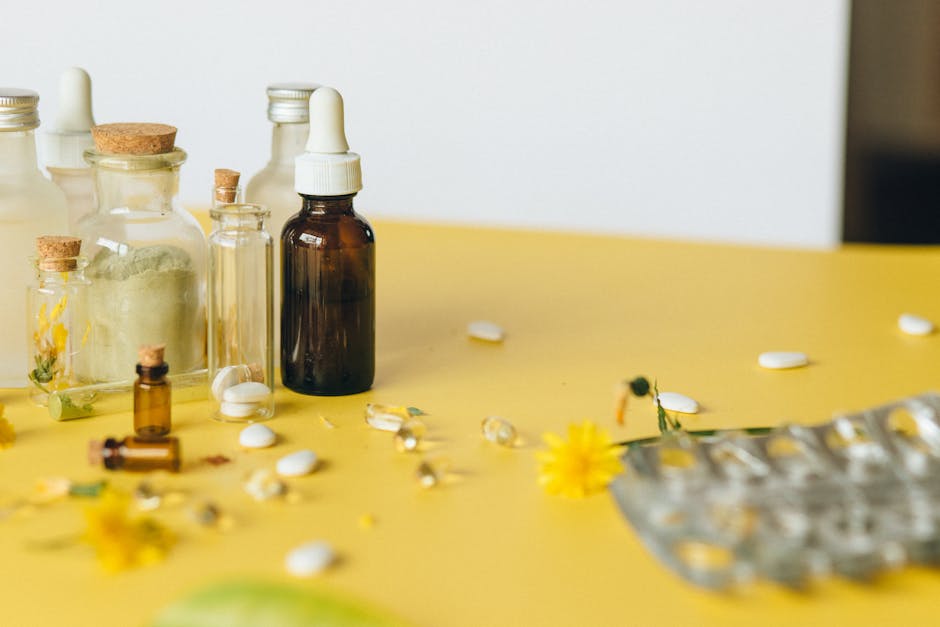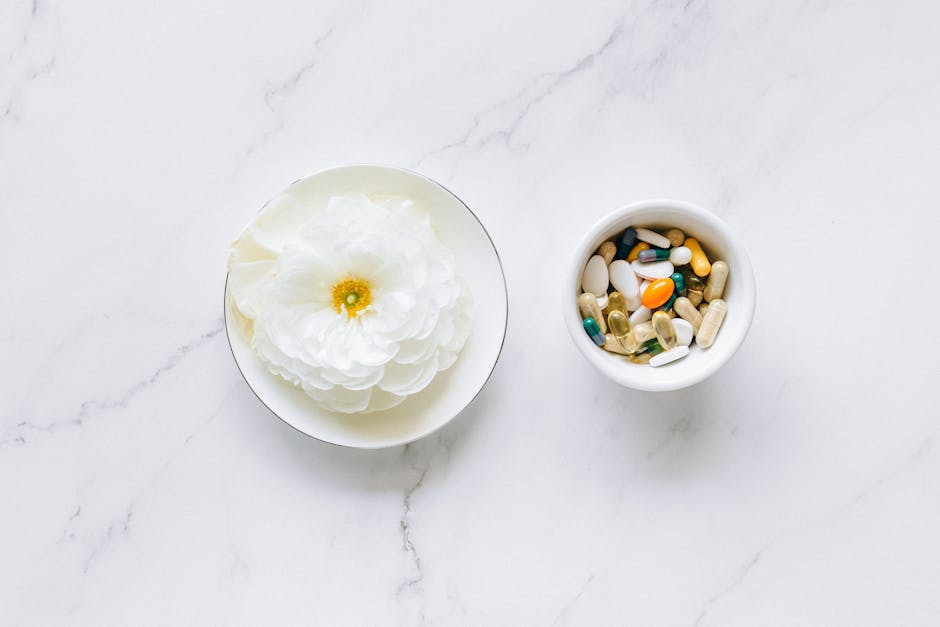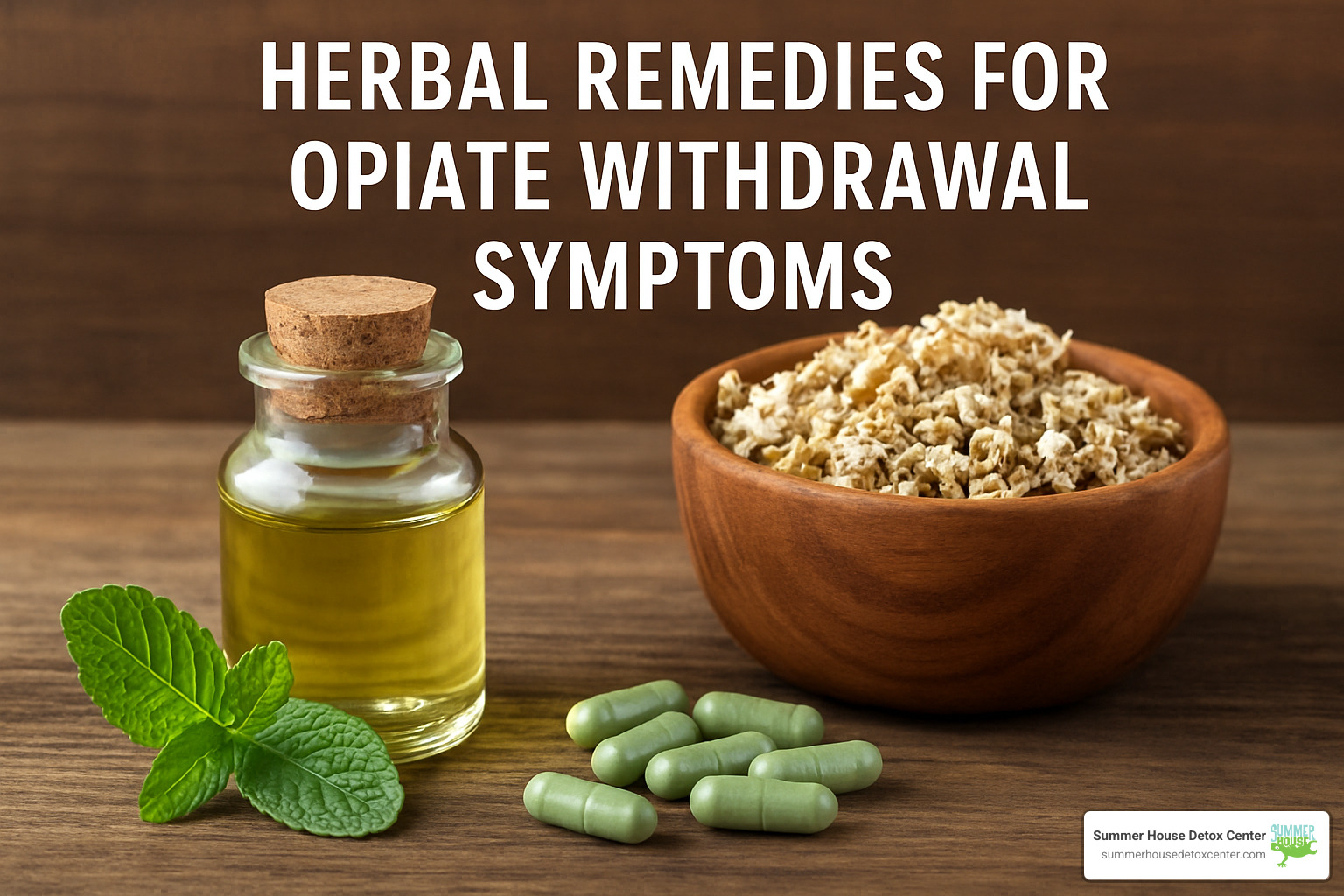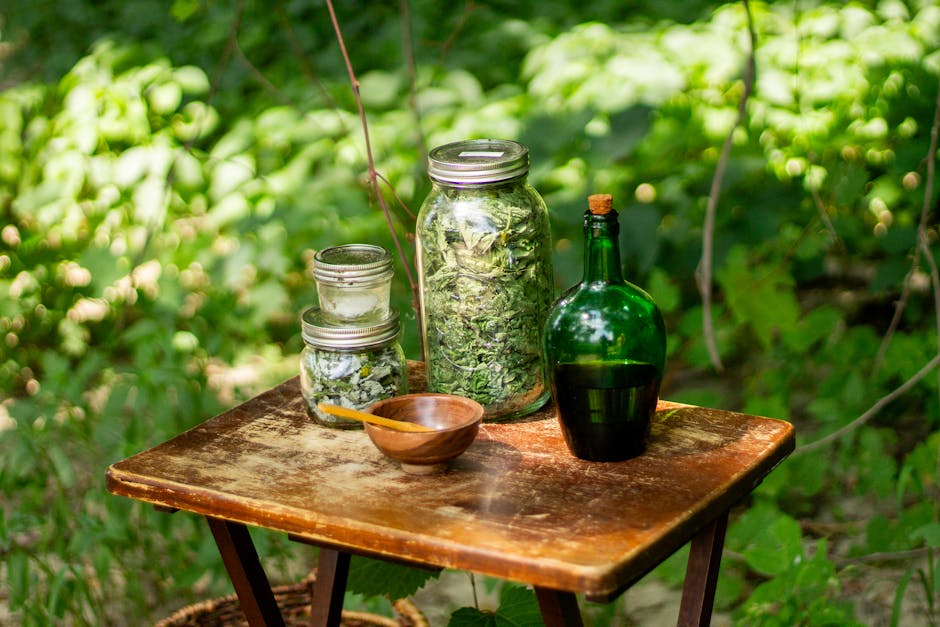Finding Relief Naturally: Understanding Your Options
Herbal remedies for opiate withdrawal symptoms can provide relief during one of the most challenging experiences of recovery. If you’re looking for natural approaches to ease withdrawal discomfort, here are the most evidence-supported options:
| Herb | Primary Benefits | Evidence Level |
|---|---|---|
| Passionflower | Anxiety reduction, sleep improvement | Moderate |
| Valerian Root | Sleep support, muscle relaxation | Moderate |
| Rosemary | Reduced bone pain, improved sleep | Clinical trials |
| Nigella sativa | Overall symptom reduction | Clinical trials |
| Ginger | Nausea and digestive comfort | Moderate |
| Saffron | Mood stabilization, craving reduction | Clinical trials |
Opiate withdrawal occurs when your body has adapted to the presence of opioids and suddenly must function without them. The resulting symptoms—ranging from anxiety and insomnia to muscle aches, nausea, and intense cravings—can be overwhelming and often lead people back to using.
What many don’t realize is that throughout history, traditional medicine systems have used plant-based remedies to ease this transition. A systematic review found that certain herbal medicines can effectively reduce withdrawal symptoms like abdominal discomfort, bone pain, and insomnia.
However, it’s crucial to approach herbal remedies with caution. Research from Iran found that 74% of herbal products marketed for opiate withdrawal contained hidden drugs including tramadol and methadone. This highlights the importance of obtaining herbs from reputable sources.
Important note: While herbs can complement recovery, they should not replace professional medical supervision during detox. The safest approach combines evidence-based treatments with carefully selected natural supports.
At Summer House Detox Center, we understand the desire to find gentler approaches to withdrawal. In this guide, we’ll explore herbal options that may help ease your journey to recovery, based on both traditional knowledge and modern research.

Why Do Opiate Withdrawal Symptoms Happen?
Have you ever wondered why stopping opiates feels so terrible? Understanding the “why” behind withdrawal can help make sense of what’s happening in your body – and why certain natural remedies might actually help.
When you use opiates regularly, your brain doesn’t just passively receive them. It actively adapts through a process called neuroadaptation. Think of it like turning down the volume on your own natural pain-relief system because there’s already so much “noise” from the external opioids.
At the cellular level, opioids latch onto what scientists call mu-opioid receptors. These receptors normally respond to your body’s natural endorphins, but opioid drugs hijack this system, triggering a flood of dopamine – the brain’s feel-good chemical that creates those powerful feelings of pleasure and pain relief.
Here’s what happens next: your brain, clever as it is, tries to maintain balance by reducing its own natural endorphin production and becoming less sensitive to dopamine. It’s essentially saying, “Well, if we’re getting all this external help, I’ll dial back our internal systems.”
When you suddenly stop taking opioids, your brain is left with reduced natural pain control and a dopamine dysregulation that can feel devastating. This creates a state scientists call hyperkatifeia – an intense negative emotional state where you become hypersensitive to stress, pain, and emotional discomfort.
This explains why withdrawal isn’t just physical – it’s deeply psychological too. The discomfort becomes a powerful form of negative reinforcement. Your brain essentially says, “Take more opioids and this terrible feeling will stop!” – making the cycle of addiction particularly difficult to break.
Medical professionals use the Clinical Opiate Withdrawal Scale (COWS) to measure withdrawal severity, looking at symptoms like:
- Physical signs (pulse rate, pupil size, sweating, tremors)
- Pain symptoms (bone/joint aches, stomach cramps)
- Psychological symptoms (anxiety, restlessness, irritability)
- Autonomic responses (runny nose, goosebumps, yawning)
The good news? Understanding this biological basis helps explain why certain herbal remedies for opiate withdrawal symptoms might actually help. Plants containing compounds that affect GABA (your brain’s calming system), support dopamine regulation, or reduce inflammation can address specific aspects of this complex withdrawal process.
At Summer House Detox Center, we believe that knowledge is power. Understanding the “why” behind your symptoms can make them slightly less frightening and help you recognize that they’re a normal part of your body healing – not a sign that something is wrong.
Top 10 Herbal Remedies for Opiate Withdrawal Symptoms
Looking for natural relief during the challenging process of opiate withdrawal? Based on both traditional wisdom and scientific research, these herbal remedies for opiate withdrawal symptoms show the most promise. We’ve carefully ranked them according to their evidence strength and safety profiles.

Passionflower (Passiflora incarnata)
If anxiety and sleeplessness are making your withdrawal journey difficult, passionflower might become your new best friend. This beautiful flowering plant works by boosting GABA, your brain’s natural calming chemical.
What’s impressive is that a double-blind trial showed passionflower extract significantly reduced withdrawal symptom severity compared to placebo. People reported feeling less anxious, less irritable, and sleeping better.
For best results, try passionflower as a soothing tea by steeping 1-2 teaspoons of dried herb in hot water for 10 minutes. If tea isn’t your thing, tinctures work well too (2-4 ml, three times daily).
Tai-Kang-Ning Formula
Traditional Chinese Medicine offers Tai-Kang-Ning (TKN), a carefully crafted blend of herbs specifically developed for addiction recovery. This isn’t just folk medicine – clinical trials have shown impressive results.
In a randomized study, people taking TKN experienced significantly reduced withdrawal symptoms with very few side effects compared to conventional treatments. What makes TKN special is how it works through multiple pathways, affecting opioid receptors, dopamine systems, and inflammation all at once.
Because this is a complex formula with many ingredients, it’s best to work with a licensed TCM practitioner who can tailor the dosage to your specific needs.
Saffron & Crocin
Those beautiful red threads from the saffron crocus aren’t just for cooking – they contain compounds that can help stabilize your mood and reduce cravings during withdrawal.
A clinical trial found that crocin (saffron’s active component) significantly reduced withdrawal scores in patients on methadone maintenance. Participants reported experiencing less anxiety, better sleep quality, and fewer intense cravings.
Saffron seems to work its magic by rebalancing dopamine and serotonin – the very neurotransmitters thrown into chaos by opioid use. Typical doses in studies range from 30mg of saffron extract to 30mg of crocin daily.
Valerian Root
The ancient Romans knew what they were doing when they used valerian for its calming effects. If withdrawal is leaving you tense, anxious, and staring at the ceiling all night, valerian root might provide gentle relief.
Animal studies show valerian works on the same GABA receptors that anti-anxiety medications target, but without the addiction risk of benzodiazepines. It also helps relax tense muscles – a welcome benefit when your body aches during withdrawal.
For sleep support, try 300-600mg of valerian extract about an hour before bedtime. For daytime anxiety, smaller doses of 200-300mg up to three times daily can take the edge off without making you too drowsy.
Black Seed (Nigella sativa)
Sometimes called black cumin, this remarkable seed contains thymoquinone, which has powerful anti-inflammatory and pain-relieving properties. A clinical trial in Pakistan found that black seed significantly decreased withdrawal symptoms without affecting vital signs.
What’s particularly valuable about black seed is its potential as a longer-term support. Study participants reported improved appetite and overall wellbeing, suggesting it might help with lingering post-acute withdrawal symptoms.
Most studies used doses between 500mg to 1000mg daily, either as capsules or as oil (about a teaspoon daily).
Curcumin (Turmeric)
That golden spice in your kitchen cabinet might be more valuable than you realized during withdrawal. Curcumin, turmeric’s active compound, offers powerful anti-inflammatory benefits that can help ease muscle aches, joint pain, and even brain inflammation associated with withdrawal.
Mouse studies have shown that curcumin helps balance noradrenergic activity – significant because the hyperactive “fight or flight” response contributes to many withdrawal symptoms like anxiety and sweating.
For therapeutic benefits, you’ll need more than a sprinkle in your curry – most studies use 500-1000mg of curcumin extract daily. Look for formulations with black pepper extract (piperine) which dramatically improves absorption.
Rosemary (Rosmarinus officinalis)
Rosemary might surprise you – it’s not just for remembrance (as Shakespeare noted) or for seasoning potatoes. An Iranian clinical trial showed that people receiving rosemary alongside methadone experienced significantly less bone pain, better sleep, and reduced sweating.
The study used a high-dose protocol with a tapering schedule. Rosemary’s benefits likely come from its rich antioxidant content and its interaction with GABA receptors, helping to calm an overexcited nervous system.

How to Use Herbal Remedies Safely
When incorporating herbal remedies for opiate withdrawal symptoms, safety should be your top priority. Start with low doses and increase gradually – this “start low, go slow” approach helps you identify what works without overwhelming your system.
Think strategically about combining herbs. Calming herbs like passionflower and valerian work beautifully at night, while more energizing options like rosemary might better serve you during daylight hours.
Different herbs shine at different stages of withdrawal. In those first difficult days, anti-nausea herbs like ginger can be lifesavers, while mood-supporting herbs like saffron become more important as acute symptoms fade.
At Summer House Detox Center, we understand both the appeal of natural approaches and the importance of safety. Our team can help you steer these options as part of a comprehensive, medically supervised detox program that keeps your comfort and well-being at the center of everything we do.
Herbs vs Conventional Medications: How Do They Stack Up?
When considering your options for managing withdrawal, you might wonder how natural approaches compare to traditional medications. It’s not about which is “better” – it’s about understanding what each offers so you can make informed choices about your recovery journey.

Let’s take an honest look at how herbal remedies for opiate withdrawal symptoms compare to conventional medications like methadone and buprenorphine.
| Treatment | Pros | Cons | Effectiveness for Withdrawal |
|---|---|---|---|
| Methadone | – Highly effective – Well-studied – Long-acting |
– Highly regulated – Physical dependence – Withdrawal when stopping |
High (gold standard) |
| Buprenorphine | – Less abuse potential – Ceiling effect on respiratory depression – Office-based treatment |
– Partial dependence – Can precipitate withdrawal if started too early – Cost |
High |
| Clonidine | – Non-opioid – Reduces many physical symptoms – No abuse potential |
– Doesn’t help cravings – Can cause low blood pressure – Sedation |
Moderate |
| Lofexidine | – FDA-approved specifically for withdrawal – Non-opioid – Less hypotension than clonidine |
– Expensive – Short-acting (multiple daily doses) – Doesn’t help cravings |
Moderate |
| Herbal Remedies | – Generally milder side effects – Less regulatory oversight – Can address specific symptoms – May be used alongside medications |
– Variable quality – Less research – Not standardized – Adulteration concerns |
Mild to Moderate (varies by herb) |
Medications like methadone and buprenorphine remain the gold standard for a reason – they work reliably for most people. These medications directly activate opioid receptors, providing controlled relief that can make withdrawal much more manageable. They’ve been studied extensively, with decades of research backing their effectiveness.
That said, medications come with their own challenges. Methadone requires daily clinic visits in many cases. Buprenorphine (often known by brand names like Suboxone) can be prescribed in office-based settings but may be costly depending on your insurance. Both medications still create a form of dependence, though one that’s generally much safer and more manageable than the original addiction.
Non-opioid medications like clonidine and lofexidine work differently – they reduce the fight-or-flight response that gets activated during withdrawal. These can help with symptoms like racing heart, sweating, and anxiety, but don’t address cravings as directly.
So where do herbs fit in? A systematic review of randomized controlled trials found that certain herbal medicines can effectively reduce withdrawal symptoms like abdominal discomfort, diarrhea, bone pain, sweating, and insomnia. The key word here is “reduce” – not eliminate. Most herbs provide moderate relief at best when used alone.
The beauty of herbal remedies for opiate withdrawal symptoms isn’t that they replace medications, but that they can work alongside them. For example, passionflower might improve sleep quality while you’re on buprenorphine. Ginger could help with the nausea that sometimes accompanies methadone. Black seed oil might reduce inflammation and discomfort during the tapering process.
At Summer House Detox Center, we believe the most effective approach combines evidence-based medications with carefully selected complementary therapies. This integrative strategy gives you multiple tools to manage withdrawal, rather than relying on a single approach.
We’ve seen how personalized combinations of conventional and complementary treatments can help people steer detox with greater comfort and dignity. Your journey through withdrawal is unique, and your treatment plan should reflect that.
Safety, Quality & Regulatory Red Flags
When it comes to herbal remedies for opiate withdrawal symptoms, quality concerns aren’t just theoretical—they’re alarmingly common. The herbal supplement world has a troubling dark side that anyone seeking natural relief should know about.
Imagine purchasing what you believe is a natural herbal remedy, only to find it contains hidden drugs like tramadol or methadone. This isn’t a rare scenario. In fact, researchers in Iran found that a shocking 74% of herbal products marketed specifically for opioid withdrawal contained undisclosed pharmaceuticals—many at potentially dangerous doses.
Even more concerning, almost all handmade and illegally distributed herbal medicines for withdrawal treatment contained at least one opioid or illegal drug. These aren’t just ineffective—they’re potentially dangerous and could derail your recovery journey.

The consequences of adulterated herbal products can be devastating. In Japan, a case where fenfluramine (a banned weight loss drug) was secretly added to an herbal tea resulted in over 800 serious health complications and several deaths. This isn’t just about getting ripped off—it’s about your safety.
How can you protect yourself? Look for these quality indicators when shopping for herbs:
GMP certification indicates the facility meets Good Manufacturing Practices standards. Third-party testing means an independent lab has verified the ingredients and purity. USP verification shows the product meets United States Pharmacopeia quality standards. Always check for clear labeling with complete ingredient lists and amounts of active compounds. Finally, consider the country of origin—products from nations with strong regulatory oversight tend to be safer.
The FDA regularly issues warnings about herbal products marketed for opioid withdrawal. While they don’t approve herbs as treatments, they do take action against products making false claims or containing hidden drugs. Unfortunately, visual inspection alone isn’t enough to spot dangerous products. An Interpol review found increasingly sophisticated methods of adulterating herbal products, making lab testing essential.
At Summer House Detox Center, we understand the appeal of natural approaches to easing withdrawal. That’s why we emphasize the importance of medical supervision during detox—our team can help you identify safe, quality-controlled supplements that might complement your treatment plan while avoiding potentially dangerous products.
Seeking natural relief is admirable, but doing so safely requires diligence. The right herbs from reputable sources can be valuable allies in your recovery journey, but counterfeit or adulterated products could set you back or cause harm. When in doubt, always consult with healthcare professionals who understand both conventional and complementary approaches to withdrawal management.
Frequently Asked Questions about Natural Opiate Detox
Do herbs replace medication-assisted treatment?
No. While herbal remedies for opiate withdrawal symptoms can provide valuable support, they should never replace evidence-based medication-assisted treatment (MAT) for opioid use disorder. Every major health organization—including the American Society of Addiction Medicine and SAMHSA—recognizes MAT as the gold standard for a reason: it works.
Think of herbs as complementary tools in your recovery toolkit, not as replacements for proven medical care. The most successful approach combines several elements working together:
Medical supervision during detox keeps you safe while medications like buprenorphine ease your body through the transition. Thoughtfully selected herbs and nutrients can address specific discomforts, while therapy helps you understand and change patterns. And ongoing support ensures you don’t have to face recovery alone.
At Summer House Detox Center, we believe in personalized care that might include complementary approaches, but always within a framework of medical safety and evidence-based treatment. Your comfort matters, but your safety and long-term recovery matter even more.
Can I mix herbal teas with methadone or buprenorphine?
This is where caution becomes extremely important. Herbs aren’t just pleasant teas—they contain active compounds that can interact with medications in ways you might not expect.
Many herbs affect your liver’s cytochrome P450 enzyme system, which is responsible for processing medications. This interaction can either weaken your medication (making it less effective) or strengthen it (potentially causing side effects).
For example, St. John’s Wort is known to significantly reduce blood levels of many medications, potentially undermining your treatment. Even something as innocent as grapefruit juice can dramatically increase the concentration of certain drugs in your bloodstream. And herbs with sedative properties might compound the drowsiness already caused by opioid medications.
Before combining any herbs with your medication, have a conversation with your healthcare provider. At Summer House Detox Center, our medical team carefully evaluates these potential interactions—we want to improve your comfort without compromising your treatment.
How long should I take herbal remedies during withdrawal?
There’s no one-size-fits-all answer here—it depends on both the specific herb and your individual needs. Let’s break it down by withdrawal stages:
During acute withdrawal (typically the first 7-14 days), herbs targeting specific symptoms like nausea, anxiety, and insomnia can provide welcome relief. Follow the guidelines for each specific herb, and ideally, work with a healthcare provider who understands both addiction medicine and herbal approaches.
For post-acute withdrawal (which can stretch from weeks to months), certain herbs may continue to be helpful. Adaptogens might support your body’s stress response, while mood-supporting herbs like saffron could ease the emotional rollercoaster that often follows detox.
When you’re ready to stop taking herbal supports, gradual tapering is generally better than stopping abruptly. This is especially true for herbs that affect neurotransmitter systems like GABA or serotonin. A typical approach might be reducing to 75% of your original dose for a week, then 50% for another week, and finally 25% for a final week before stopping completely.
This gentle step-down helps prevent any rebound symptoms and gives your body time to adjust. Your recovery journey is already challenging enough—there’s no need to create additional problems by stopping supportive therapies too suddenly.

Conclusion
The journey through opiate withdrawal is undoubtedly challenging, but herbal remedies for opiate withdrawal symptoms can offer welcome comfort along the way. From the gentle anxiety relief of passionflower to the clinically-proven benefits of rosemary for bone pain and sleep disturbances, nature provides meaningful supports for many aspects of the withdrawal experience.
Yet herbs shine brightest when they’re part of a personalized detox approach that prioritizes safety and effectiveness. The concerning statistics about adulterated herbal products (remember that shocking 74% figure?) remind us that quality matters tremendously when it comes to natural remedies.
At Summer House Detox Center, we understand why many people are drawn to more natural approaches during recovery. Many of us have walked this path ourselves, both professionally and personally. We’ve seen how thoughtfully selected herbs can complement conventional treatments, creating a more comfortable detox experience that addresses the whole person – body, mind, and spirit.
Our approach is never one-size-fits-all. We take the time to understand your unique situation, preferences, and needs. Whether you’re interested in exploring evidence-based herbal supports or focusing entirely on conventional approaches, our team works alongside you to create a detox plan that feels right for your individual journey.
The road to recovery is deeply personal, and we honor that by providing care that’s both medically sound and deeply human. Our experienced staff brings not just professional expertise but genuine compassion to your care, creating an environment where healing can truly begin.
While herbal remedies for opiate withdrawal symptoms can provide meaningful relief, they work best when used as part of a comprehensive, medically supervised program that combines the best of conventional medicine with carefully selected complementary approaches.
If you or someone you love is struggling with opiate dependence, we’re here to help you take that first step toward recovery with confidence, comfort, and complete support. At Summer House Detox Center, you’ll find not just effective treatment, but a team that genuinely cares about your wellbeing and success in recovery.
